Effective Leadership in Healthcare: Assessment Task 2 Report
VerifiedAdded on 2023/01/23
|9
|3460
|83
Report
AI Summary
This report examines the critical role of leadership in the healthcare sector, emphasizing its impact on service delivery, workforce management, and organizational success. It highlights the importance of effective leadership in a competitive environment, where differentiation is key. The report delves into various leadership styles, including trait, situational, and transformational leadership, with a focus on the transformational approach. It discusses the challenges faced by healthcare organizations, such as workforce conflicts and skill gaps, and how leaders can address these issues. The report emphasizes the need for leaders to foster a positive work environment, promote communication, and empower employees to provide quality care. The report also explores leadership's role in creating a competitive mindset, understanding individual responsibilities, and ensuring the sustainability of healthcare organizations by providing effective services. Drawing from personal experience, the report underscores the significance of identifying and developing effective leaders to navigate challenges and improve patient outcomes. The report concludes with a discussion on evidence-based leadership practices and their impact on employee morale and overall organizational performance.
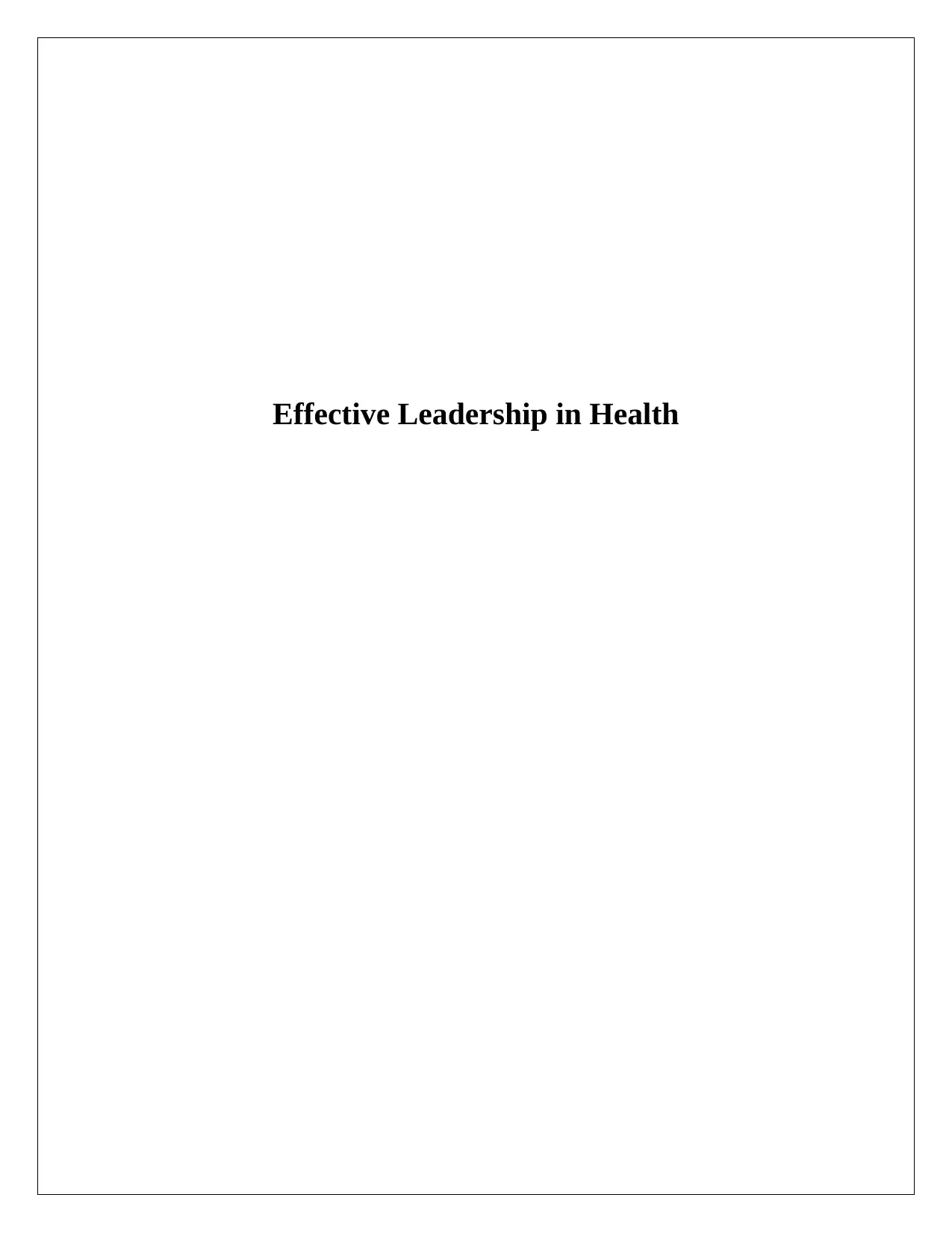
Effective Leadership in Health
Paraphrase This Document
Need a fresh take? Get an instant paraphrase of this document with our AI Paraphraser
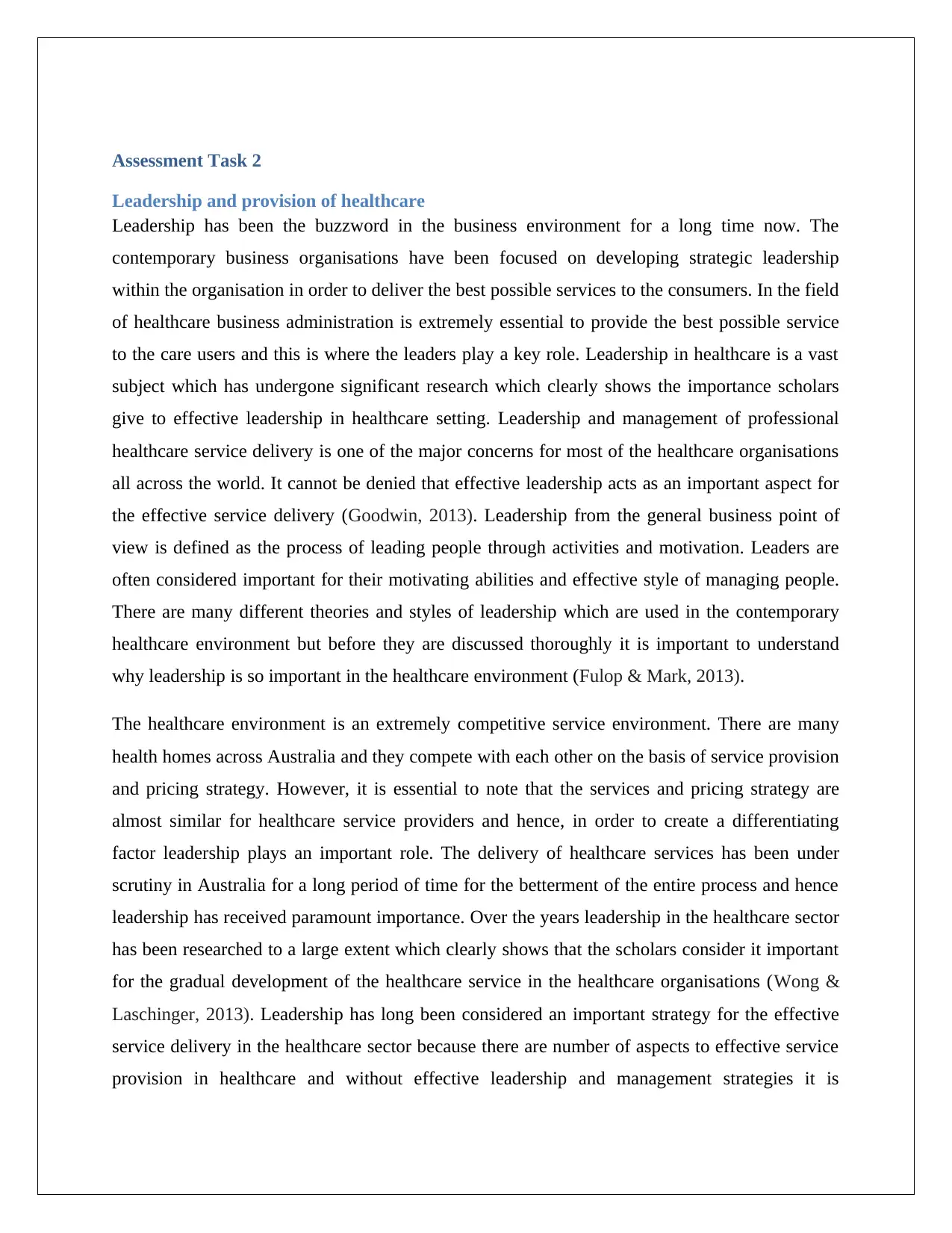
Assessment Task 2
Leadership and provision of healthcare
Leadership has been the buzzword in the business environment for a long time now. The
contemporary business organisations have been focused on developing strategic leadership
within the organisation in order to deliver the best possible services to the consumers. In the field
of healthcare business administration is extremely essential to provide the best possible service
to the care users and this is where the leaders play a key role. Leadership in healthcare is a vast
subject which has undergone significant research which clearly shows the importance scholars
give to effective leadership in healthcare setting. Leadership and management of professional
healthcare service delivery is one of the major concerns for most of the healthcare organisations
all across the world. It cannot be denied that effective leadership acts as an important aspect for
the effective service delivery (Goodwin, 2013). Leadership from the general business point of
view is defined as the process of leading people through activities and motivation. Leaders are
often considered important for their motivating abilities and effective style of managing people.
There are many different theories and styles of leadership which are used in the contemporary
healthcare environment but before they are discussed thoroughly it is important to understand
why leadership is so important in the healthcare environment (Fulop & Mark, 2013).
The healthcare environment is an extremely competitive service environment. There are many
health homes across Australia and they compete with each other on the basis of service provision
and pricing strategy. However, it is essential to note that the services and pricing strategy are
almost similar for healthcare service providers and hence, in order to create a differentiating
factor leadership plays an important role. The delivery of healthcare services has been under
scrutiny in Australia for a long period of time for the betterment of the entire process and hence
leadership has received paramount importance. Over the years leadership in the healthcare sector
has been researched to a large extent which clearly shows that the scholars consider it important
for the gradual development of the healthcare service in the healthcare organisations (Wong &
Laschinger, 2013). Leadership has long been considered an important strategy for the effective
service delivery in the healthcare sector because there are number of aspects to effective service
provision in healthcare and without effective leadership and management strategies it is
Leadership and provision of healthcare
Leadership has been the buzzword in the business environment for a long time now. The
contemporary business organisations have been focused on developing strategic leadership
within the organisation in order to deliver the best possible services to the consumers. In the field
of healthcare business administration is extremely essential to provide the best possible service
to the care users and this is where the leaders play a key role. Leadership in healthcare is a vast
subject which has undergone significant research which clearly shows the importance scholars
give to effective leadership in healthcare setting. Leadership and management of professional
healthcare service delivery is one of the major concerns for most of the healthcare organisations
all across the world. It cannot be denied that effective leadership acts as an important aspect for
the effective service delivery (Goodwin, 2013). Leadership from the general business point of
view is defined as the process of leading people through activities and motivation. Leaders are
often considered important for their motivating abilities and effective style of managing people.
There are many different theories and styles of leadership which are used in the contemporary
healthcare environment but before they are discussed thoroughly it is important to understand
why leadership is so important in the healthcare environment (Fulop & Mark, 2013).
The healthcare environment is an extremely competitive service environment. There are many
health homes across Australia and they compete with each other on the basis of service provision
and pricing strategy. However, it is essential to note that the services and pricing strategy are
almost similar for healthcare service providers and hence, in order to create a differentiating
factor leadership plays an important role. The delivery of healthcare services has been under
scrutiny in Australia for a long period of time for the betterment of the entire process and hence
leadership has received paramount importance. Over the years leadership in the healthcare sector
has been researched to a large extent which clearly shows that the scholars consider it important
for the gradual development of the healthcare service in the healthcare organisations (Wong &
Laschinger, 2013). Leadership has long been considered an important strategy for the effective
service delivery in the healthcare sector because there are number of aspects to effective service
provision in healthcare and without effective leadership and management strategies it is
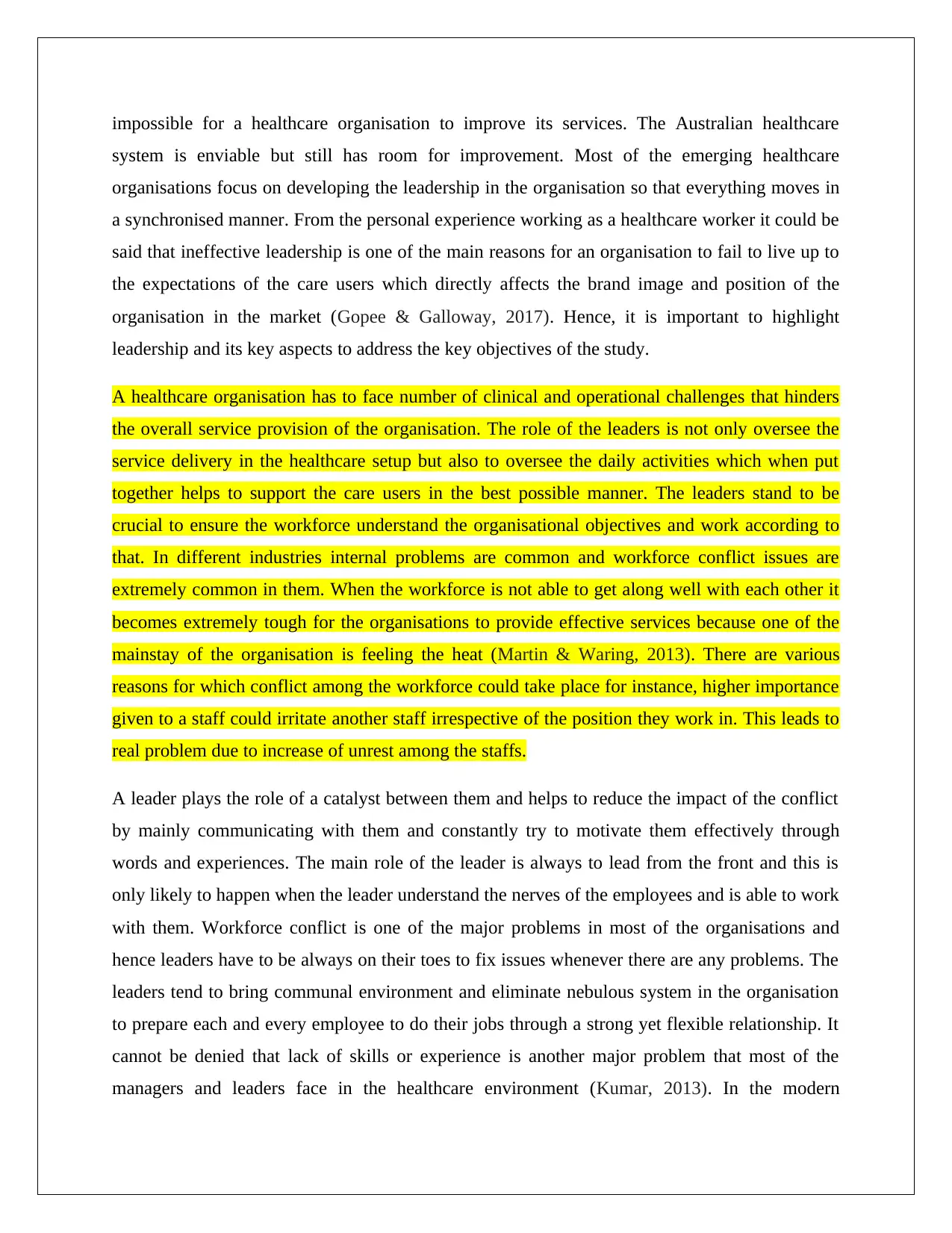
impossible for a healthcare organisation to improve its services. The Australian healthcare
system is enviable but still has room for improvement. Most of the emerging healthcare
organisations focus on developing the leadership in the organisation so that everything moves in
a synchronised manner. From the personal experience working as a healthcare worker it could be
said that ineffective leadership is one of the main reasons for an organisation to fail to live up to
the expectations of the care users which directly affects the brand image and position of the
organisation in the market (Gopee & Galloway, 2017). Hence, it is important to highlight
leadership and its key aspects to address the key objectives of the study.
A healthcare organisation has to face number of clinical and operational challenges that hinders
the overall service provision of the organisation. The role of the leaders is not only oversee the
service delivery in the healthcare setup but also to oversee the daily activities which when put
together helps to support the care users in the best possible manner. The leaders stand to be
crucial to ensure the workforce understand the organisational objectives and work according to
that. In different industries internal problems are common and workforce conflict issues are
extremely common in them. When the workforce is not able to get along well with each other it
becomes extremely tough for the organisations to provide effective services because one of the
mainstay of the organisation is feeling the heat (Martin & Waring, 2013). There are various
reasons for which conflict among the workforce could take place for instance, higher importance
given to a staff could irritate another staff irrespective of the position they work in. This leads to
real problem due to increase of unrest among the staffs.
A leader plays the role of a catalyst between them and helps to reduce the impact of the conflict
by mainly communicating with them and constantly try to motivate them effectively through
words and experiences. The main role of the leader is always to lead from the front and this is
only likely to happen when the leader understand the nerves of the employees and is able to work
with them. Workforce conflict is one of the major problems in most of the organisations and
hence leaders have to be always on their toes to fix issues whenever there are any problems. The
leaders tend to bring communal environment and eliminate nebulous system in the organisation
to prepare each and every employee to do their jobs through a strong yet flexible relationship. It
cannot be denied that lack of skills or experience is another major problem that most of the
managers and leaders face in the healthcare environment (Kumar, 2013). In the modern
system is enviable but still has room for improvement. Most of the emerging healthcare
organisations focus on developing the leadership in the organisation so that everything moves in
a synchronised manner. From the personal experience working as a healthcare worker it could be
said that ineffective leadership is one of the main reasons for an organisation to fail to live up to
the expectations of the care users which directly affects the brand image and position of the
organisation in the market (Gopee & Galloway, 2017). Hence, it is important to highlight
leadership and its key aspects to address the key objectives of the study.
A healthcare organisation has to face number of clinical and operational challenges that hinders
the overall service provision of the organisation. The role of the leaders is not only oversee the
service delivery in the healthcare setup but also to oversee the daily activities which when put
together helps to support the care users in the best possible manner. The leaders stand to be
crucial to ensure the workforce understand the organisational objectives and work according to
that. In different industries internal problems are common and workforce conflict issues are
extremely common in them. When the workforce is not able to get along well with each other it
becomes extremely tough for the organisations to provide effective services because one of the
mainstay of the organisation is feeling the heat (Martin & Waring, 2013). There are various
reasons for which conflict among the workforce could take place for instance, higher importance
given to a staff could irritate another staff irrespective of the position they work in. This leads to
real problem due to increase of unrest among the staffs.
A leader plays the role of a catalyst between them and helps to reduce the impact of the conflict
by mainly communicating with them and constantly try to motivate them effectively through
words and experiences. The main role of the leader is always to lead from the front and this is
only likely to happen when the leader understand the nerves of the employees and is able to work
with them. Workforce conflict is one of the major problems in most of the organisations and
hence leaders have to be always on their toes to fix issues whenever there are any problems. The
leaders tend to bring communal environment and eliminate nebulous system in the organisation
to prepare each and every employee to do their jobs through a strong yet flexible relationship. It
cannot be denied that lack of skills or experience is another major problem that most of the
managers and leaders face in the healthcare environment (Kumar, 2013). In the modern
⊘ This is a preview!⊘
Do you want full access?
Subscribe today to unlock all pages.

Trusted by 1+ million students worldwide
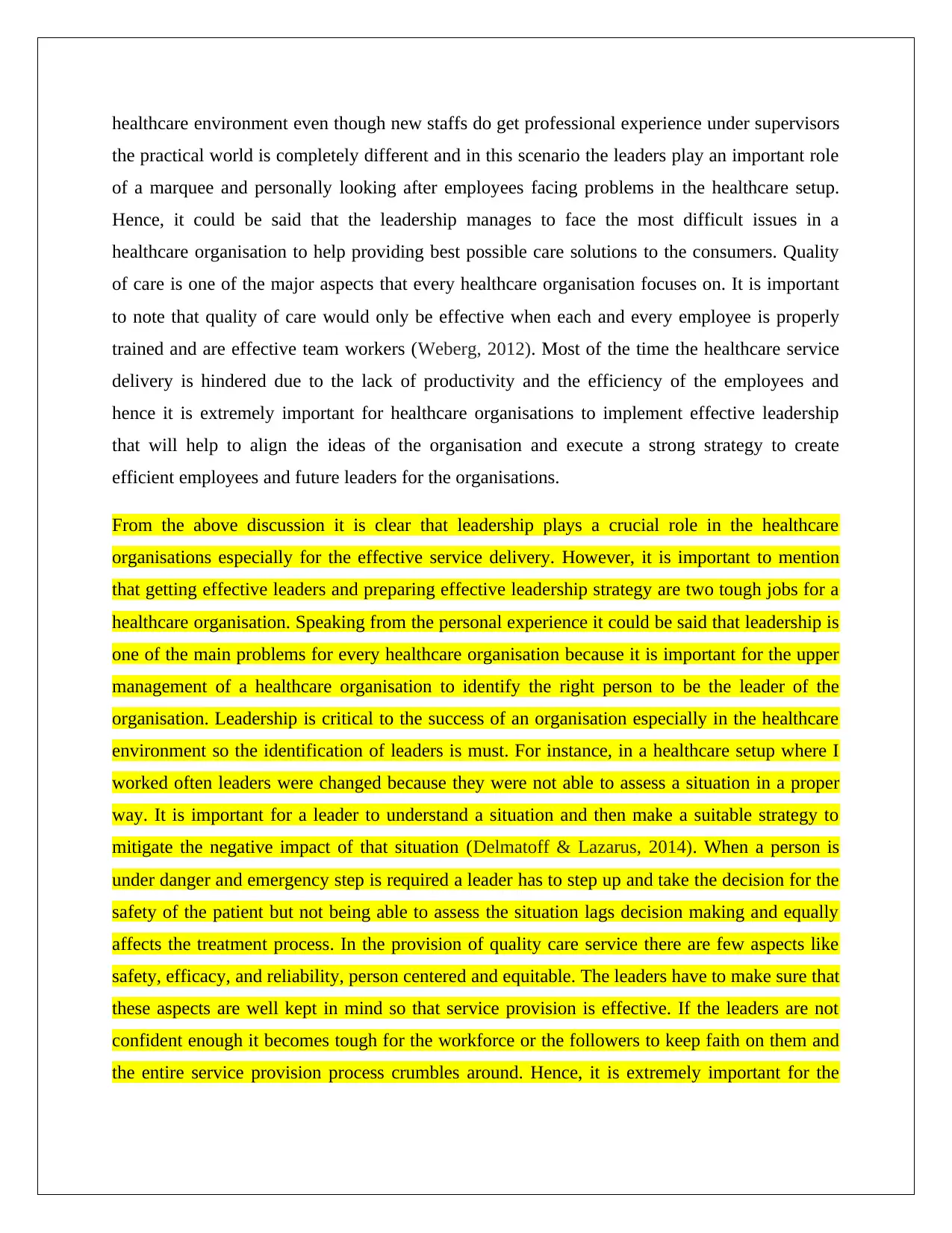
healthcare environment even though new staffs do get professional experience under supervisors
the practical world is completely different and in this scenario the leaders play an important role
of a marquee and personally looking after employees facing problems in the healthcare setup.
Hence, it could be said that the leadership manages to face the most difficult issues in a
healthcare organisation to help providing best possible care solutions to the consumers. Quality
of care is one of the major aspects that every healthcare organisation focuses on. It is important
to note that quality of care would only be effective when each and every employee is properly
trained and are effective team workers (Weberg, 2012). Most of the time the healthcare service
delivery is hindered due to the lack of productivity and the efficiency of the employees and
hence it is extremely important for healthcare organisations to implement effective leadership
that will help to align the ideas of the organisation and execute a strong strategy to create
efficient employees and future leaders for the organisations.
From the above discussion it is clear that leadership plays a crucial role in the healthcare
organisations especially for the effective service delivery. However, it is important to mention
that getting effective leaders and preparing effective leadership strategy are two tough jobs for a
healthcare organisation. Speaking from the personal experience it could be said that leadership is
one of the main problems for every healthcare organisation because it is important for the upper
management of a healthcare organisation to identify the right person to be the leader of the
organisation. Leadership is critical to the success of an organisation especially in the healthcare
environment so the identification of leaders is must. For instance, in a healthcare setup where I
worked often leaders were changed because they were not able to assess a situation in a proper
way. It is important for a leader to understand a situation and then make a suitable strategy to
mitigate the negative impact of that situation (Delmatoff & Lazarus, 2014). When a person is
under danger and emergency step is required a leader has to step up and take the decision for the
safety of the patient but not being able to assess the situation lags decision making and equally
affects the treatment process. In the provision of quality care service there are few aspects like
safety, efficacy, and reliability, person centered and equitable. The leaders have to make sure that
these aspects are well kept in mind so that service provision is effective. If the leaders are not
confident enough it becomes tough for the workforce or the followers to keep faith on them and
the entire service provision process crumbles around. Hence, it is extremely important for the
the practical world is completely different and in this scenario the leaders play an important role
of a marquee and personally looking after employees facing problems in the healthcare setup.
Hence, it could be said that the leadership manages to face the most difficult issues in a
healthcare organisation to help providing best possible care solutions to the consumers. Quality
of care is one of the major aspects that every healthcare organisation focuses on. It is important
to note that quality of care would only be effective when each and every employee is properly
trained and are effective team workers (Weberg, 2012). Most of the time the healthcare service
delivery is hindered due to the lack of productivity and the efficiency of the employees and
hence it is extremely important for healthcare organisations to implement effective leadership
that will help to align the ideas of the organisation and execute a strong strategy to create
efficient employees and future leaders for the organisations.
From the above discussion it is clear that leadership plays a crucial role in the healthcare
organisations especially for the effective service delivery. However, it is important to mention
that getting effective leaders and preparing effective leadership strategy are two tough jobs for a
healthcare organisation. Speaking from the personal experience it could be said that leadership is
one of the main problems for every healthcare organisation because it is important for the upper
management of a healthcare organisation to identify the right person to be the leader of the
organisation. Leadership is critical to the success of an organisation especially in the healthcare
environment so the identification of leaders is must. For instance, in a healthcare setup where I
worked often leaders were changed because they were not able to assess a situation in a proper
way. It is important for a leader to understand a situation and then make a suitable strategy to
mitigate the negative impact of that situation (Delmatoff & Lazarus, 2014). When a person is
under danger and emergency step is required a leader has to step up and take the decision for the
safety of the patient but not being able to assess the situation lags decision making and equally
affects the treatment process. In the provision of quality care service there are few aspects like
safety, efficacy, and reliability, person centered and equitable. The leaders have to make sure that
these aspects are well kept in mind so that service provision is effective. If the leaders are not
confident enough it becomes tough for the workforce or the followers to keep faith on them and
the entire service provision process crumbles around. Hence, it is extremely important for the
Paraphrase This Document
Need a fresh take? Get an instant paraphrase of this document with our AI Paraphraser
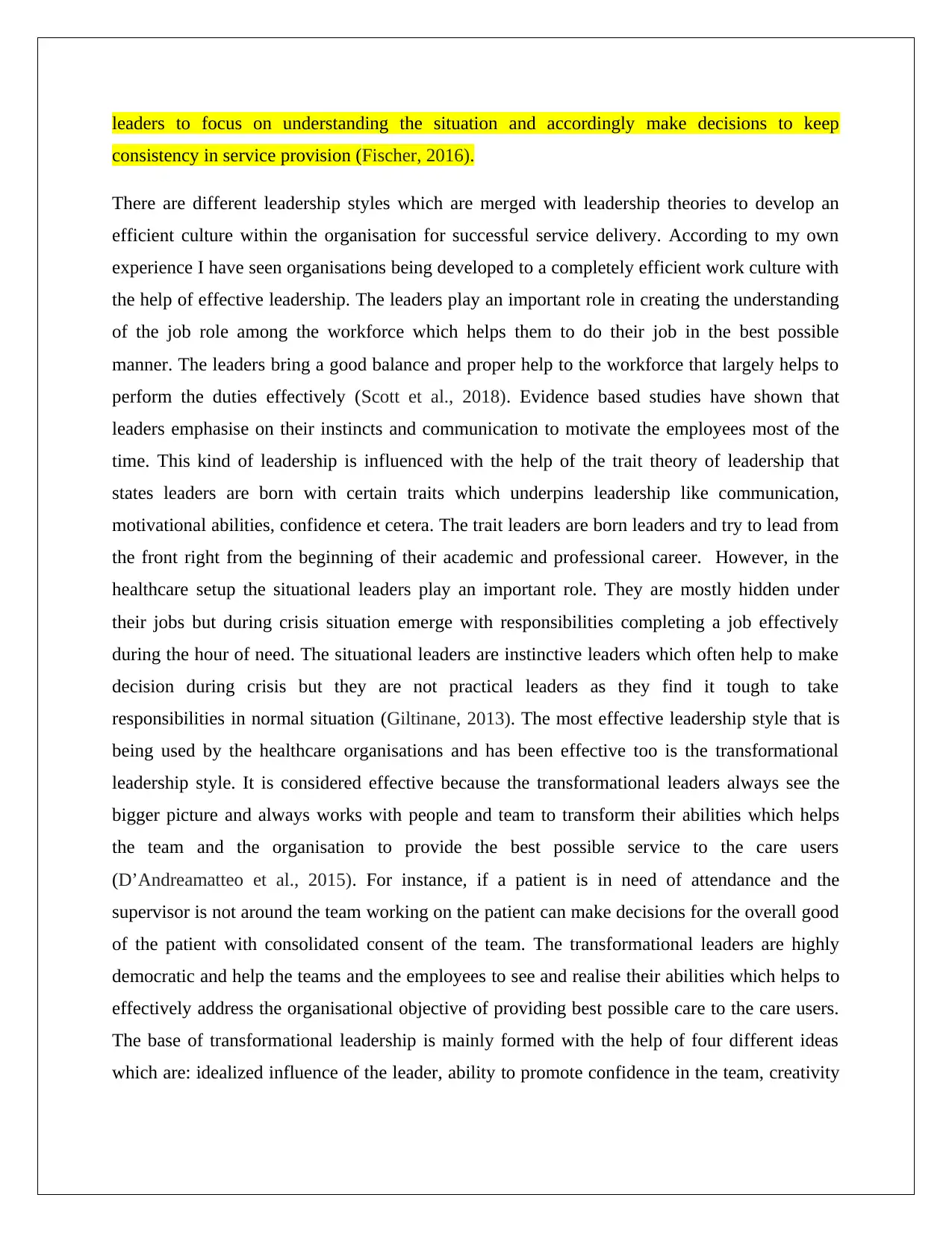
leaders to focus on understanding the situation and accordingly make decisions to keep
consistency in service provision (Fischer, 2016).
There are different leadership styles which are merged with leadership theories to develop an
efficient culture within the organisation for successful service delivery. According to my own
experience I have seen organisations being developed to a completely efficient work culture with
the help of effective leadership. The leaders play an important role in creating the understanding
of the job role among the workforce which helps them to do their job in the best possible
manner. The leaders bring a good balance and proper help to the workforce that largely helps to
perform the duties effectively (Scott et al., 2018). Evidence based studies have shown that
leaders emphasise on their instincts and communication to motivate the employees most of the
time. This kind of leadership is influenced with the help of the trait theory of leadership that
states leaders are born with certain traits which underpins leadership like communication,
motivational abilities, confidence et cetera. The trait leaders are born leaders and try to lead from
the front right from the beginning of their academic and professional career. However, in the
healthcare setup the situational leaders play an important role. They are mostly hidden under
their jobs but during crisis situation emerge with responsibilities completing a job effectively
during the hour of need. The situational leaders are instinctive leaders which often help to make
decision during crisis but they are not practical leaders as they find it tough to take
responsibilities in normal situation (Giltinane, 2013). The most effective leadership style that is
being used by the healthcare organisations and has been effective too is the transformational
leadership style. It is considered effective because the transformational leaders always see the
bigger picture and always works with people and team to transform their abilities which helps
the team and the organisation to provide the best possible service to the care users
(D’Andreamatteo et al., 2015). For instance, if a patient is in need of attendance and the
supervisor is not around the team working on the patient can make decisions for the overall good
of the patient with consolidated consent of the team. The transformational leaders are highly
democratic and help the teams and the employees to see and realise their abilities which helps to
effectively address the organisational objective of providing best possible care to the care users.
The base of transformational leadership is mainly formed with the help of four different ideas
which are: idealized influence of the leader, ability to promote confidence in the team, creativity
consistency in service provision (Fischer, 2016).
There are different leadership styles which are merged with leadership theories to develop an
efficient culture within the organisation for successful service delivery. According to my own
experience I have seen organisations being developed to a completely efficient work culture with
the help of effective leadership. The leaders play an important role in creating the understanding
of the job role among the workforce which helps them to do their job in the best possible
manner. The leaders bring a good balance and proper help to the workforce that largely helps to
perform the duties effectively (Scott et al., 2018). Evidence based studies have shown that
leaders emphasise on their instincts and communication to motivate the employees most of the
time. This kind of leadership is influenced with the help of the trait theory of leadership that
states leaders are born with certain traits which underpins leadership like communication,
motivational abilities, confidence et cetera. The trait leaders are born leaders and try to lead from
the front right from the beginning of their academic and professional career. However, in the
healthcare setup the situational leaders play an important role. They are mostly hidden under
their jobs but during crisis situation emerge with responsibilities completing a job effectively
during the hour of need. The situational leaders are instinctive leaders which often help to make
decision during crisis but they are not practical leaders as they find it tough to take
responsibilities in normal situation (Giltinane, 2013). The most effective leadership style that is
being used by the healthcare organisations and has been effective too is the transformational
leadership style. It is considered effective because the transformational leaders always see the
bigger picture and always works with people and team to transform their abilities which helps
the team and the organisation to provide the best possible service to the care users
(D’Andreamatteo et al., 2015). For instance, if a patient is in need of attendance and the
supervisor is not around the team working on the patient can make decisions for the overall good
of the patient with consolidated consent of the team. The transformational leaders are highly
democratic and help the teams and the employees to see and realise their abilities which helps to
effectively address the organisational objective of providing best possible care to the care users.
The base of transformational leadership is mainly formed with the help of four different ideas
which are: idealized influence of the leader, ability to promote confidence in the team, creativity
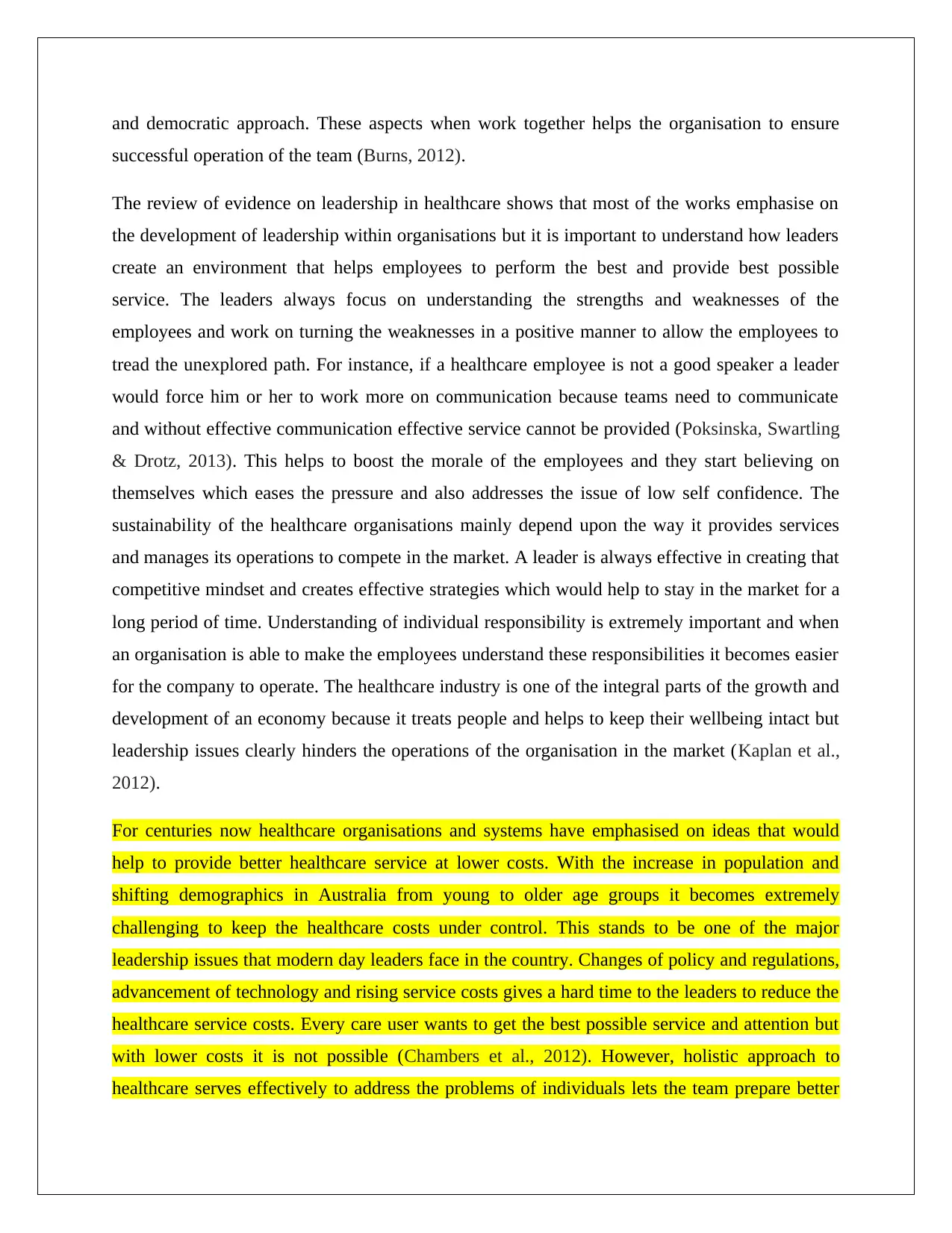
and democratic approach. These aspects when work together helps the organisation to ensure
successful operation of the team (Burns, 2012).
The review of evidence on leadership in healthcare shows that most of the works emphasise on
the development of leadership within organisations but it is important to understand how leaders
create an environment that helps employees to perform the best and provide best possible
service. The leaders always focus on understanding the strengths and weaknesses of the
employees and work on turning the weaknesses in a positive manner to allow the employees to
tread the unexplored path. For instance, if a healthcare employee is not a good speaker a leader
would force him or her to work more on communication because teams need to communicate
and without effective communication effective service cannot be provided (Poksinska, Swartling
& Drotz, 2013). This helps to boost the morale of the employees and they start believing on
themselves which eases the pressure and also addresses the issue of low self confidence. The
sustainability of the healthcare organisations mainly depend upon the way it provides services
and manages its operations to compete in the market. A leader is always effective in creating that
competitive mindset and creates effective strategies which would help to stay in the market for a
long period of time. Understanding of individual responsibility is extremely important and when
an organisation is able to make the employees understand these responsibilities it becomes easier
for the company to operate. The healthcare industry is one of the integral parts of the growth and
development of an economy because it treats people and helps to keep their wellbeing intact but
leadership issues clearly hinders the operations of the organisation in the market (Kaplan et al.,
2012).
For centuries now healthcare organisations and systems have emphasised on ideas that would
help to provide better healthcare service at lower costs. With the increase in population and
shifting demographics in Australia from young to older age groups it becomes extremely
challenging to keep the healthcare costs under control. This stands to be one of the major
leadership issues that modern day leaders face in the country. Changes of policy and regulations,
advancement of technology and rising service costs gives a hard time to the leaders to reduce the
healthcare service costs. Every care user wants to get the best possible service and attention but
with lower costs it is not possible (Chambers et al., 2012). However, holistic approach to
healthcare serves effectively to address the problems of individuals lets the team prepare better
successful operation of the team (Burns, 2012).
The review of evidence on leadership in healthcare shows that most of the works emphasise on
the development of leadership within organisations but it is important to understand how leaders
create an environment that helps employees to perform the best and provide best possible
service. The leaders always focus on understanding the strengths and weaknesses of the
employees and work on turning the weaknesses in a positive manner to allow the employees to
tread the unexplored path. For instance, if a healthcare employee is not a good speaker a leader
would force him or her to work more on communication because teams need to communicate
and without effective communication effective service cannot be provided (Poksinska, Swartling
& Drotz, 2013). This helps to boost the morale of the employees and they start believing on
themselves which eases the pressure and also addresses the issue of low self confidence. The
sustainability of the healthcare organisations mainly depend upon the way it provides services
and manages its operations to compete in the market. A leader is always effective in creating that
competitive mindset and creates effective strategies which would help to stay in the market for a
long period of time. Understanding of individual responsibility is extremely important and when
an organisation is able to make the employees understand these responsibilities it becomes easier
for the company to operate. The healthcare industry is one of the integral parts of the growth and
development of an economy because it treats people and helps to keep their wellbeing intact but
leadership issues clearly hinders the operations of the organisation in the market (Kaplan et al.,
2012).
For centuries now healthcare organisations and systems have emphasised on ideas that would
help to provide better healthcare service at lower costs. With the increase in population and
shifting demographics in Australia from young to older age groups it becomes extremely
challenging to keep the healthcare costs under control. This stands to be one of the major
leadership issues that modern day leaders face in the country. Changes of policy and regulations,
advancement of technology and rising service costs gives a hard time to the leaders to reduce the
healthcare service costs. Every care user wants to get the best possible service and attention but
with lower costs it is not possible (Chambers et al., 2012). However, holistic approach to
healthcare serves effectively to address the problems of individuals lets the team prepare better
⊘ This is a preview!⊘
Do you want full access?
Subscribe today to unlock all pages.

Trusted by 1+ million students worldwide
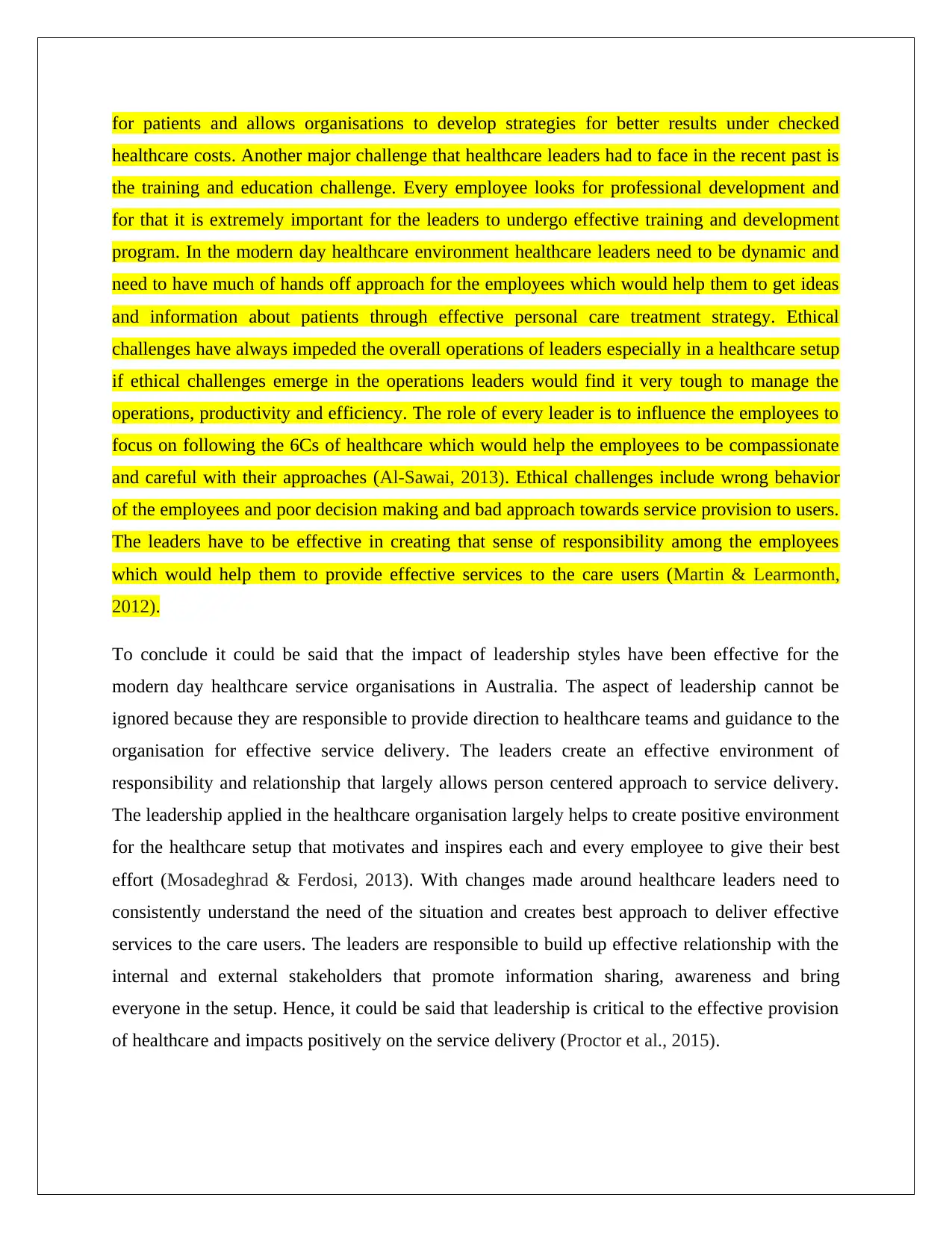
for patients and allows organisations to develop strategies for better results under checked
healthcare costs. Another major challenge that healthcare leaders had to face in the recent past is
the training and education challenge. Every employee looks for professional development and
for that it is extremely important for the leaders to undergo effective training and development
program. In the modern day healthcare environment healthcare leaders need to be dynamic and
need to have much of hands off approach for the employees which would help them to get ideas
and information about patients through effective personal care treatment strategy. Ethical
challenges have always impeded the overall operations of leaders especially in a healthcare setup
if ethical challenges emerge in the operations leaders would find it very tough to manage the
operations, productivity and efficiency. The role of every leader is to influence the employees to
focus on following the 6Cs of healthcare which would help the employees to be compassionate
and careful with their approaches (Al-Sawai, 2013). Ethical challenges include wrong behavior
of the employees and poor decision making and bad approach towards service provision to users.
The leaders have to be effective in creating that sense of responsibility among the employees
which would help them to provide effective services to the care users (Martin & Learmonth,
2012).
To conclude it could be said that the impact of leadership styles have been effective for the
modern day healthcare service organisations in Australia. The aspect of leadership cannot be
ignored because they are responsible to provide direction to healthcare teams and guidance to the
organisation for effective service delivery. The leaders create an effective environment of
responsibility and relationship that largely allows person centered approach to service delivery.
The leadership applied in the healthcare organisation largely helps to create positive environment
for the healthcare setup that motivates and inspires each and every employee to give their best
effort (Mosadeghrad & Ferdosi, 2013). With changes made around healthcare leaders need to
consistently understand the need of the situation and creates best approach to deliver effective
services to the care users. The leaders are responsible to build up effective relationship with the
internal and external stakeholders that promote information sharing, awareness and bring
everyone in the setup. Hence, it could be said that leadership is critical to the effective provision
of healthcare and impacts positively on the service delivery (Proctor et al., 2015).
healthcare costs. Another major challenge that healthcare leaders had to face in the recent past is
the training and education challenge. Every employee looks for professional development and
for that it is extremely important for the leaders to undergo effective training and development
program. In the modern day healthcare environment healthcare leaders need to be dynamic and
need to have much of hands off approach for the employees which would help them to get ideas
and information about patients through effective personal care treatment strategy. Ethical
challenges have always impeded the overall operations of leaders especially in a healthcare setup
if ethical challenges emerge in the operations leaders would find it very tough to manage the
operations, productivity and efficiency. The role of every leader is to influence the employees to
focus on following the 6Cs of healthcare which would help the employees to be compassionate
and careful with their approaches (Al-Sawai, 2013). Ethical challenges include wrong behavior
of the employees and poor decision making and bad approach towards service provision to users.
The leaders have to be effective in creating that sense of responsibility among the employees
which would help them to provide effective services to the care users (Martin & Learmonth,
2012).
To conclude it could be said that the impact of leadership styles have been effective for the
modern day healthcare service organisations in Australia. The aspect of leadership cannot be
ignored because they are responsible to provide direction to healthcare teams and guidance to the
organisation for effective service delivery. The leaders create an effective environment of
responsibility and relationship that largely allows person centered approach to service delivery.
The leadership applied in the healthcare organisation largely helps to create positive environment
for the healthcare setup that motivates and inspires each and every employee to give their best
effort (Mosadeghrad & Ferdosi, 2013). With changes made around healthcare leaders need to
consistently understand the need of the situation and creates best approach to deliver effective
services to the care users. The leaders are responsible to build up effective relationship with the
internal and external stakeholders that promote information sharing, awareness and bring
everyone in the setup. Hence, it could be said that leadership is critical to the effective provision
of healthcare and impacts positively on the service delivery (Proctor et al., 2015).
Paraphrase This Document
Need a fresh take? Get an instant paraphrase of this document with our AI Paraphraser
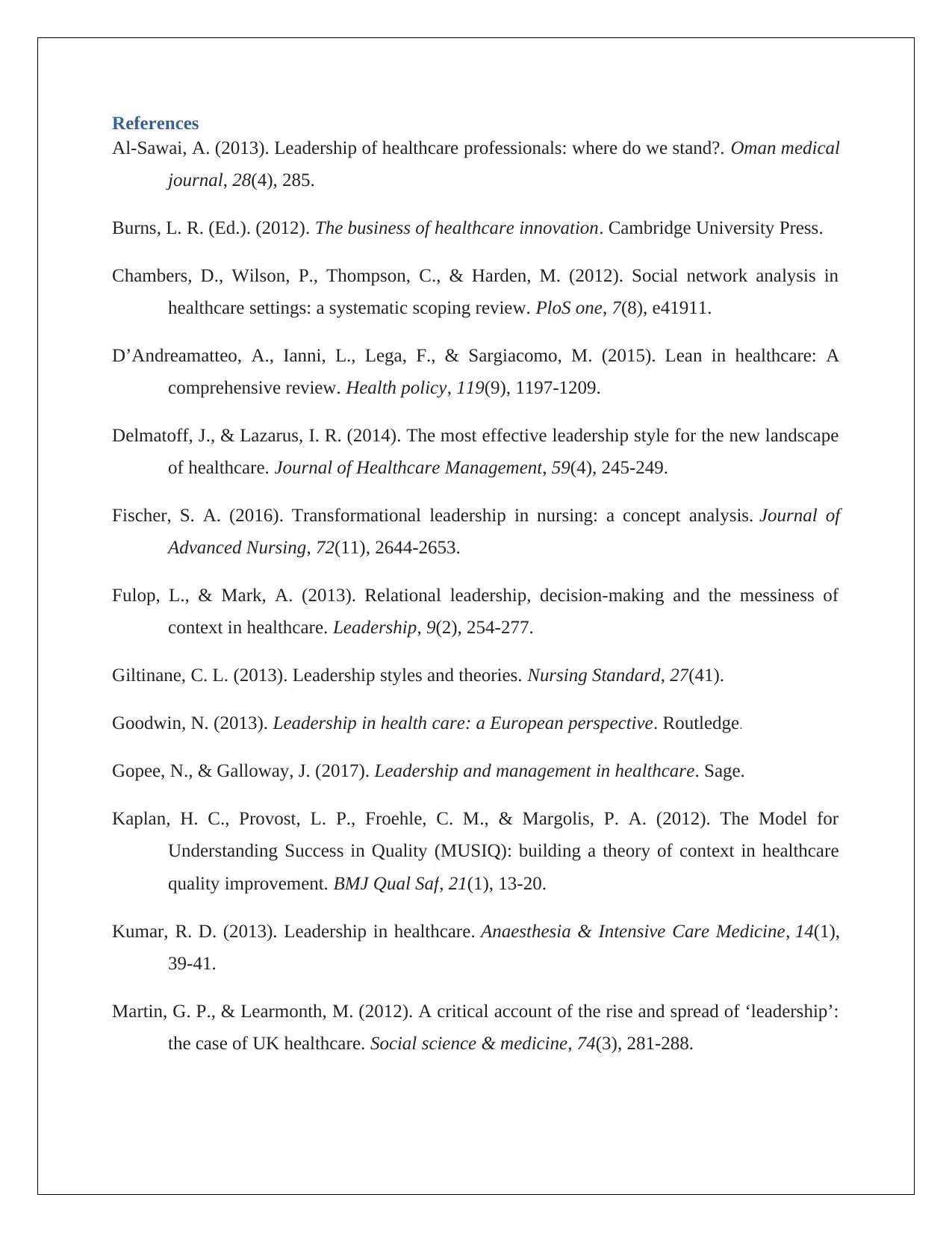
References
Al-Sawai, A. (2013). Leadership of healthcare professionals: where do we stand?. Oman medical
journal, 28(4), 285.
Burns, L. R. (Ed.). (2012). The business of healthcare innovation. Cambridge University Press.
Chambers, D., Wilson, P., Thompson, C., & Harden, M. (2012). Social network analysis in
healthcare settings: a systematic scoping review. PloS one, 7(8), e41911.
D’Andreamatteo, A., Ianni, L., Lega, F., & Sargiacomo, M. (2015). Lean in healthcare: A
comprehensive review. Health policy, 119(9), 1197-1209.
Delmatoff, J., & Lazarus, I. R. (2014). The most effective leadership style for the new landscape
of healthcare. Journal of Healthcare Management, 59(4), 245-249.
Fischer, S. A. (2016). Transformational leadership in nursing: a concept analysis. Journal of
Advanced Nursing, 72(11), 2644-2653.
Fulop, L., & Mark, A. (2013). Relational leadership, decision-making and the messiness of
context in healthcare. Leadership, 9(2), 254-277.
Giltinane, C. L. (2013). Leadership styles and theories. Nursing Standard, 27(41).
Goodwin, N. (2013). Leadership in health care: a European perspective. Routledge.
Gopee, N., & Galloway, J. (2017). Leadership and management in healthcare. Sage.
Kaplan, H. C., Provost, L. P., Froehle, C. M., & Margolis, P. A. (2012). The Model for
Understanding Success in Quality (MUSIQ): building a theory of context in healthcare
quality improvement. BMJ Qual Saf, 21(1), 13-20.
Kumar, R. D. (2013). Leadership in healthcare. Anaesthesia & Intensive Care Medicine, 14(1),
39-41.
Martin, G. P., & Learmonth, M. (2012). A critical account of the rise and spread of ‘leadership’:
the case of UK healthcare. Social science & medicine, 74(3), 281-288.
Al-Sawai, A. (2013). Leadership of healthcare professionals: where do we stand?. Oman medical
journal, 28(4), 285.
Burns, L. R. (Ed.). (2012). The business of healthcare innovation. Cambridge University Press.
Chambers, D., Wilson, P., Thompson, C., & Harden, M. (2012). Social network analysis in
healthcare settings: a systematic scoping review. PloS one, 7(8), e41911.
D’Andreamatteo, A., Ianni, L., Lega, F., & Sargiacomo, M. (2015). Lean in healthcare: A
comprehensive review. Health policy, 119(9), 1197-1209.
Delmatoff, J., & Lazarus, I. R. (2014). The most effective leadership style for the new landscape
of healthcare. Journal of Healthcare Management, 59(4), 245-249.
Fischer, S. A. (2016). Transformational leadership in nursing: a concept analysis. Journal of
Advanced Nursing, 72(11), 2644-2653.
Fulop, L., & Mark, A. (2013). Relational leadership, decision-making and the messiness of
context in healthcare. Leadership, 9(2), 254-277.
Giltinane, C. L. (2013). Leadership styles and theories. Nursing Standard, 27(41).
Goodwin, N. (2013). Leadership in health care: a European perspective. Routledge.
Gopee, N., & Galloway, J. (2017). Leadership and management in healthcare. Sage.
Kaplan, H. C., Provost, L. P., Froehle, C. M., & Margolis, P. A. (2012). The Model for
Understanding Success in Quality (MUSIQ): building a theory of context in healthcare
quality improvement. BMJ Qual Saf, 21(1), 13-20.
Kumar, R. D. (2013). Leadership in healthcare. Anaesthesia & Intensive Care Medicine, 14(1),
39-41.
Martin, G. P., & Learmonth, M. (2012). A critical account of the rise and spread of ‘leadership’:
the case of UK healthcare. Social science & medicine, 74(3), 281-288.
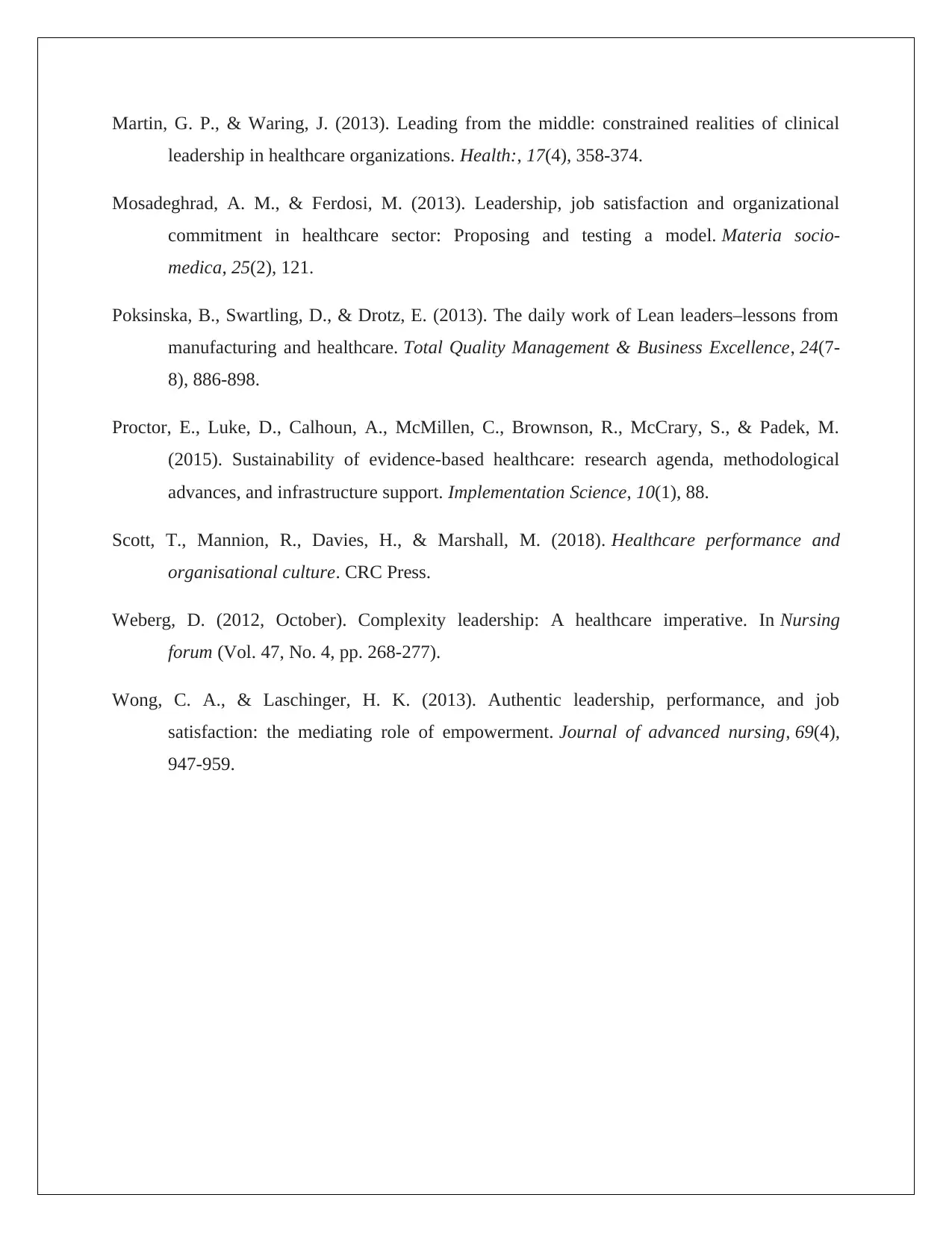
Martin, G. P., & Waring, J. (2013). Leading from the middle: constrained realities of clinical
leadership in healthcare organizations. Health:, 17(4), 358-374.
Mosadeghrad, A. M., & Ferdosi, M. (2013). Leadership, job satisfaction and organizational
commitment in healthcare sector: Proposing and testing a model. Materia socio-
medica, 25(2), 121.
Poksinska, B., Swartling, D., & Drotz, E. (2013). The daily work of Lean leaders–lessons from
manufacturing and healthcare. Total Quality Management & Business Excellence, 24(7-
8), 886-898.
Proctor, E., Luke, D., Calhoun, A., McMillen, C., Brownson, R., McCrary, S., & Padek, M.
(2015). Sustainability of evidence-based healthcare: research agenda, methodological
advances, and infrastructure support. Implementation Science, 10(1), 88.
Scott, T., Mannion, R., Davies, H., & Marshall, M. (2018). Healthcare performance and
organisational culture. CRC Press.
Weberg, D. (2012, October). Complexity leadership: A healthcare imperative. In Nursing
forum (Vol. 47, No. 4, pp. 268-277).
Wong, C. A., & Laschinger, H. K. (2013). Authentic leadership, performance, and job
satisfaction: the mediating role of empowerment. Journal of advanced nursing, 69(4),
947-959.
leadership in healthcare organizations. Health:, 17(4), 358-374.
Mosadeghrad, A. M., & Ferdosi, M. (2013). Leadership, job satisfaction and organizational
commitment in healthcare sector: Proposing and testing a model. Materia socio-
medica, 25(2), 121.
Poksinska, B., Swartling, D., & Drotz, E. (2013). The daily work of Lean leaders–lessons from
manufacturing and healthcare. Total Quality Management & Business Excellence, 24(7-
8), 886-898.
Proctor, E., Luke, D., Calhoun, A., McMillen, C., Brownson, R., McCrary, S., & Padek, M.
(2015). Sustainability of evidence-based healthcare: research agenda, methodological
advances, and infrastructure support. Implementation Science, 10(1), 88.
Scott, T., Mannion, R., Davies, H., & Marshall, M. (2018). Healthcare performance and
organisational culture. CRC Press.
Weberg, D. (2012, October). Complexity leadership: A healthcare imperative. In Nursing
forum (Vol. 47, No. 4, pp. 268-277).
Wong, C. A., & Laschinger, H. K. (2013). Authentic leadership, performance, and job
satisfaction: the mediating role of empowerment. Journal of advanced nursing, 69(4),
947-959.
⊘ This is a preview!⊘
Do you want full access?
Subscribe today to unlock all pages.

Trusted by 1+ million students worldwide
1 out of 9
Related Documents
Your All-in-One AI-Powered Toolkit for Academic Success.
+13062052269
info@desklib.com
Available 24*7 on WhatsApp / Email
![[object Object]](/_next/static/media/star-bottom.7253800d.svg)
Unlock your academic potential
Copyright © 2020–2025 A2Z Services. All Rights Reserved. Developed and managed by ZUCOL.





